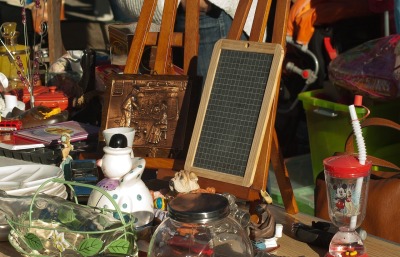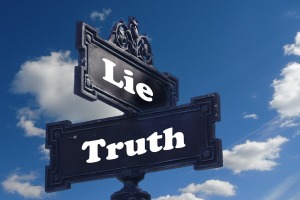To all you hoarders: Where shall I store all the stuff?

I have two Pembroke Welsh Corgi dogs that I take for walks (more like meanderings) around the neighborhood when the weather is decent. If you’ve ever wanted a dog that allows you to make exact replicas of them in about two weeks from the double coat of fur they shed, this is the breed for you.
We first moved into our neighborhood in the winter, and I noticed during our walks that many of our neighbor’s cars were parked outside their 3-car garages, which I thought was kind of odd. Once the weather turned warm and the garage doors started being left open, I understood why.
More than a few of my neighbors have garages that are so packed to the ceilings with stuff you have to blink twice to remind yourself that you’re not watching an episode of Hoarders.
And these are large homes with basements that match the dimensions of their first floor. Most have a combo of finished/unfinished basements so you’d think there would be plenty of room for extra things, but nope.
I’ve learned this isn’t out of the ordinary because, according to a recent article in The Wall Street Journal, America has a stuff and storage addiction: “There are self-storage facilities around the world, but nowhere have they been more popular to rent and profitable to own than in the U.S., thanks to Americans’ propensity to accumulate more stuff than they can squeeze into their homes.”
Or garages.
Statistics cited in the article say that 1 in 10 Americans lease self-storage units. “I’ve had one six years,” said one customer; “I’ve probably paid for the stuff six times over.”
Yowza…six times over? Why are we like this?
Why we have a stuff addiction
Now, to be fair, sometimes our too-much-stuff state of affairs is temporary. Maybe we’re storing extra furniture or similar items for family or ourselves that are truly needed and will be used again in a short while.
But then there’s the compulsion to buy and keep stuff that borders on full-blown oniomania (shopaholic disease).
For example, Tori Spelling, the daughter of billionaire entertainment mogul Aaron Spelling, is now reported to be semi-homeless because of her spending habits. One report said: “There’s no end to the spending. In 2016 she had a room stacked to the ceiling with boxes she didn’t even open. There were clothes stuffed into the bathroom with price tags still on them.”
Why do that?
One reason is that we’re unhappy and looking to cure our blues with the next order from Amazon, unaware that the wisest man ever wrote long ago: “All that my eyes desired I did not refuse them. I did not withhold my heart from any pleasure…and behold all was vanity” (Ecc. 2:10-11).
Those great philosophers, the heavy metal band Metallica (wink), discovered the same thing at the height of their success, with their frontman James Hetfield calling it out loud in his song King Nothing, which contains these lyrics.:
Dig for gold
Dig for fame
You dig to make your name
Are you pacified?
…
Just want one thing, just to play the king
But the castle crumbled and you're left with just a name
Where's your crown, King Nothing?
Call it the “this thing will make me happy” lie, which, when it fails, leads to the “this experience will make me happy” lie and usually concludes with the “this person will make me happy” lie. All are horizontal attempts at finding happiness that falls short when not accompanied by going vertical first.
Jesus tells us, “Seek first His kingdom and His righteousness, and all these things will be added to you” (Matt. 6:33). Meaning: looking up first and getting the right relationship with God supersedes the act of looking around for meaning, purpose, and fulfillment in the creation (stuff) itself.
Something tells me if self-storage existed in Jesus’ day, His parable of the rich fool in Luke would look something like this:
“Beware, and be on your guard against every form of greed; for not even when one has an abundance does his life consist of his possessions.” And He told them a parable, saying, “The land of a rich man was very productive. And he began reasoning to himself, saying, ‘What shall I do, since I have no place to store my crops?’ Then he said, ‘This is what I will do: I will rent space at a self-storage, and there I will store all my grain and my goods. And I will say to my soul, “Soul, you have many goods laid up for many years to come; take your ease, eat, drink and be merry”’ (Luke 12:15-19).
That sure would have been easier than tearing down his existing barns and building bigger ones as in the original parable, but the ending would still be the same: “But God said to him, ‘You fool! This very night your soul is required of you; and now who will own what you have prepared?’ So is the man who stores up treasure for himself, and is not rich toward God” (Luke 12:20-21).
Notice in that parable that possessing things isn’t necessarily bad, but God comes first. And, whatever we do have we hold loosely in case it needs to go for a higher purpose.
Who knows, maybe my neighbors’ garages are storing things that will be used one day, but we’ve been here for three years and nothing has really changed. Every time I pass by them and see all the stuff, I think: “Where your treasure is, there your heart will be also” (Luke 12:34).
Or to quote Metallica again: Where’s your crown King Nothing?
Robin Schumacher is an accomplished software executive and Christian apologist who has written many articles, authored and contributed to several Christian books, appeared on nationally syndicated radio programs, and presented at apologetic events. He holds a BS in Business, Master's in Christian apologetics and a Ph.D. in New Testament. His latest book is, A Confident Faith: Winning people to Christ with the apologetics of the Apostle Paul.




























